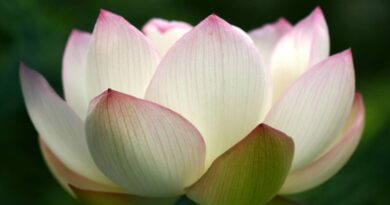CONTENTMENT
Contentment
§ 5.1 “‘This Dhamma is for one who is content, not for one who is discontent.’ Thus was it said. With reference to what was it said? There is the case where a monk is content with any old robe cloth at all, any old almsfood, any old lodging, any old medicinal requisites for curing sickness at all. ‘This Dhamma is for one who is content, not for one who is discontent.’ Thus was it said. And with reference to this was it said.” — AN 8:30
§ 5.2 “And how is a monk content? Just as a bird, wherever it goes, flies with its wings as its only burden; so too is he content with a set of robes to provide for his body and alms food to provide for his hunger. Wherever he goes, he takes only his barest necessities along. This is how a monk is content.” — DN 2
§ 5.3 “There is the case where a monk is content with any old robe cloth at all. He speaks in praise of being content with any old robe cloth at all. He does not, for the sake of robe cloth, do anything unseemly or inappropriate. Not getting cloth, he is not agitated. Getting cloth, he uses it unattached to it, uninfatuated, guiltless, seeing the drawbacks (of attachment to it), and discerning the escape from them. He does not, on account of his contentment with any old robe cloth at all, exalt himself or disparage others. In this he is diligent, deft, alert, & mindful. This is said to be a monk standing firm in the ancient, original traditions of the noble ones.
“Furthermore, the monk is content with any old almsfood at all. He speaks in praise of being content with any old almsfood at all. He does not, for the sake of almsfood, do anything unseemly or inappropriate. Not getting almsfood, he is not agitated. Getting almsfood, he uses it unattached to it, uninfatuated, guiltless, seeing the drawbacks (of attachment to it), and discerning the escape from them. He does not, on account of his contentment with any old almsfood at all, exalt himself or disparage others. In this he is diligent, deft, alert, & mindful. This is said to be a monk standing firm in the ancient, original traditions of the noble ones.
“Furthermore, the monk is content with any old lodging at all. He speaks in praise of being content with any old lodging at all. He does not, for the sake of lodging, do anything unseemly or inappropriate. Not getting lodging, he is not agitated. Getting lodging, he uses it unattached to it, uninfatuated, guiltless, seeing the drawbacks (of attachment to it), and discerning the escape from them. He does not, on account of his contentment with any old lodging at all, exalt himself or disparage others. In this he is diligent, deft, alert, & mindful. This is said to be a monk standing firm in the ancient, original traditions of the noble ones.” — AN 4:28
§ 5.4 MahāKassapa:
Coming down from my dwelling place,
I entered the city for alms,
stood courteously next to a leper
eating his meal.
He, with his rotting hand,
tossed me a morsel of food,
and as the morsel was dropping,
a finger fell off
right there.
Sitting next to a wall,
I ate that morsel of food,
and neither while eating it,
nor having eaten,
did I feel
any disgust.
Whoever has mastered
left-over scraps for food,
smelly urine for medicine,
the foot of a tree for a dwelling,
cast-off rags for robes:
He is a man
of the four directions.
***
This is enough for me—
desiring to do jhāna,
resolute, mindful;
enough for me—
desiring the goal,
resolute,
a monk;
enough for me—
desiring comfort,
resolute,
in training;
enough for me—
desiring my duty,
resolute,
Such.
***
There is no such pleasure for me
in the music of a five-piece band
as there is when my mind
is at one,
seeing the Dhamma
aright. — Thag 18
§ 5.5 On one occasion the Blessed One was staying near Āḷavī on a spread of leaves by a cattle track in a siṁsapā forest. Then Hatthaka of Āḷavī, out roaming & rambling for exercise, saw the Blessed One sitting on a spread of leaves by the cattle track in the simsapa forest. On seeing him, he went to him and, on arrival, having bowed down to him, sat to one side. As he was sitting there he said to the Blessed One, “Lord, I hope the Blessed One has slept in ease.”
“Yes, young man. I have slept in ease. Of those in the world who sleep in ease, I am one.”
“But cold, lord, is the winter night. The ‘Between-the-Eights’ is a time of snowfall. Hard is the ground trampled by cattle hooves. Thin is the spread of leaves. Sparse are the leaves in the trees. Thin are your ochre robes. And cold blows the Verambha wind. Yet still the Blessed One says, ‘Yes, young man. I have slept in ease. Of those in the world who sleep in ease, I am one.’”
“In that case, young man, I will question you in return. Answer as you see fit. Now, what do you think: Suppose a householder or householder’s son has a house with a gabled roof, plastered inside & out, draft-free, with close-fitting door & windows shut against the wind. Inside he has a horse-hair couch spread with a long-fleeced coverlet, a white wool coverlet, an embroidered coverlet, a rug of kadali-deer hide, with a canopy above, & red cushions on either side. And there a lamp would be burning, and his four wives, with their many charms, would be attending to him. Would he sleep in ease, or not? Or how does this strike you?”
“Yes, lord, he would sleep in ease. Of those in the world who sleep in ease, he would be one.”
“But what do you think, young man. Might there arise in that householder or householder’s son any bodily fevers or fevers of mind born of passion so that—burned with those passion-born fevers—he would sleep miserably?”
“Yes, lord.”
“As for those passion-born fevers—burned with which the householder or householder’s son would sleep miserably—that passion has been abandoned by the Tathāgata, its root destroyed, made like a palmyra stump, deprived of the conditions of existence, not destined for future arising. Therefore he sleeps in ease.
“Now, what do you think, young man. Might there arise in that householder or householder’s son any bodily fevers or fevers of mind born of aversion so that—burned with those aversion-born fevers—he would sleep miserably?”
“Yes, lord.”
“As for those aversion-born fevers—burned with which the householder or householder’s son would sleep miserably—that aversion has been abandoned by the Tathāgata, its root destroyed, made like a palmyra stump, deprived of the conditions of existence, not destined for future arising. Therefore he sleeps in ease.
“Now, what do you think, young man. Might there arise in that householder or householder’s son any bodily fevers or fevers of mind born of delusion so that—burned with those delusion-born fevers—he would sleep miserably?”
“Yes, lord.”
“As for those delusion-born fevers—burned with which the householder or householder’s son would sleep miserably—that delusion has been abandoned by the Tathāgata, its root destroyed, made like a palmyra stump, deprived of the conditions of existence, not destined for future arising. Therefore he sleeps in ease.
“Always, always,
he sleeps in ease:
the brāhman totally unbound,
who doesn’t adhere
to sensual pleasures,
who’s without acquisitions
& cooled.
Having
cut all ties
& subdued fear in the heart,
calmed,
he sleeps in ease,
having reached peace
of awareness.” — AN 3:35
§ 5.6 I have heard that on one occasion the Blessed One was staying at Anupiyā in the Mango Orchard. Now at that time, Ven. Bhaddiya Kāligodha, on going to a forest, to the foot of a tree, or to an empty dwelling, would repeatedly exclaim, “What bliss! What bliss!” A large number of monks heard Ven. Bhaddiya Kāligodha, on going to a forest, to the foot of a tree, or to an empty dwelling, repeatedly exclaim, “What bliss! What bliss!” and on hearing him, the thought occurred to them, “There’s no doubt but that Ven. Bhaddiya Kāligodha doesn’t enjoy leading the holy life, for when he was a householder he knew the bliss of kingship, so that now, on recollecting that, he is repeatedly exclaiming, ‘What bliss! What bliss!’” They went to the Blessed One and, on arrival, having bowed down to him, sat to one side. As they were sitting there, they told him: “Ven. Bhaddiya Kāligodha, lord, on going to a forest, to the foot of a tree, or to an empty dwelling, repeatedly exclaims, ‘What bliss! What bliss!’ There’s no doubt but that Ven. Bhaddiya Kāligodha doesn’t enjoy leading the holy life, for when he was a householder he knew the bliss of kingship, so that now, on recollecting that, he is repeatedly exclaiming, ‘What bliss! What bliss!’”
Then the Blessed One told a certain monk, “Come, monk. In my name, call Bhaddiya, saying, ‘The Teacher calls you, my friend.’”
“As you say, lord,” the monk answered and, having gone to Ven. Bhaddiya, on arrival he said, “The Teacher calls you, my friend.”
“As you say, my friend,” Ven. Bhaddiya replied. Then he went to the Blessed One and, on arrival, having bowed down to him, sat to one side. As he was sitting there, the Blessed One said to him, “Is it true, Bhaddiya that, on going to a forest, to the foot of a tree, or to an empty dwelling, you repeatedly exclaim, ‘What bliss! What bliss!’?”
“Yes, lord.”
“What meaning do you have in mind that you repeatedly exclaim, ‘What bliss! What bliss!’?”
“Before, when I has a householder, maintaining the bliss of kingship, I had guards posted within and without the royal apartments, within and without the city, within and without the countryside. But even though I was thus guarded, thus protected, I dwelled in fear—agitated, distrustful, and afraid. But now, on going alone to a forest, to the foot of a tree, or to an empty dwelling, I dwell without fear, unagitated, confident, and unafraid—unconcerned, unruffled, my wants satisfied, with my mind like a wild deer. This is the meaning I have in mind that I repeatedly exclaim, ‘What bliss! What bliss!’”
Then, on realizing the significance of that, the Blessed One on that occasion exclaimed:
In whom there exists
no provocation,
& for whom becoming & non-becoming
are overcome,
he is one—
beyond fear,
blissful,
without grief,
whom the devas can’t see. — Ud 2:10



